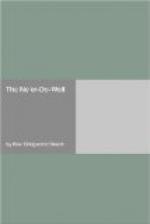Kirk suddenly realized to the full how egregious his request to call must have appeared to the Spanish girl. What a fool he had been, to be sure! For a moment he lost himself in a contemplation of the difficulties so unexpectedly presented. He was brought to himself by the words:
“—to-morrow you will go to work.”
“What’s that?” he broke forth in a panic. “I can’t go to work to-morrow; I’m going hunting.”
Cortlandt eyed him curiously.
“I didn’t say to-morrow. I said Runnells ’phoned that he would be ready for you day after to-morrow. What is the matter with you? Have you lost your head over shooting, or don’t you care to work?”
“Oh, neither,” he said, hastily. “I merely misunderstood you. Of course, the sooner the better.”
“Yes, as you say, the sooner the better,” said Cortlandt, with a shade of meaning. “Well, good-night, and good-luck to you in your shooting!”
It was with much less self-assurance that Kirk set out again on the next morning, for this was his last day of grace, and he realized that unless he accomplished something definite it might be a considerable time before he could continue his quest. In view of what the girl had said regarding her engagement, delays seemed particularly dangerous.
He haunted the vicinity of the meeting-place all the morning, but no one came, and a heavy shower at midday drove him into the palm-thatched hut for shelter. When it had passed he put an end to his indecision and boldly took the other path. At least he would find out where she lived and who she was. But once again he was disappointed. The trail led out through the grove to the rain-drenched pasture, where it disappeared, and, instead of one house, he saw three, half hidden in foliage and all facing in the opposite direction. They stood upon the crest of a hill fronting the road, and he realized that the pool might be the bathing-place for the inmates of one or all of them.
Up past the grazing stock he went and around to the front of the nearest residence, which proved to be a low, rambling, bungalow affair with many outhouses smothered in a profusion of vines and fruit-trees. Evidently it was unoccupied, for heavy wooden shutters barricaded the windows, and no one answered his knock, although some pigeons perched upon the tile roof cooed at him in a friendly manner. He struck across lots to the next house, but met with no better success, and he approached the third dwelling with a certain hesitation, for it was his last chance. It was more pretentious than the rest, and stood proudly upon the highest point of the ridge, up which ran a private road guarded by twin rows of stately royal palms, whose perfectly rounded trunks seemed to have been turned upon some giant lathe. The house itself was large, square, and double-galleried. It was shaded by lofty hard-wood trees and overlooked a sort of formal garden, now badly in need of care. The road was of shell, and where it entered the grounds passed through a huge iron gate suspended upon concrete pillars. The whole place had an air of wealth and exclusiveness.




